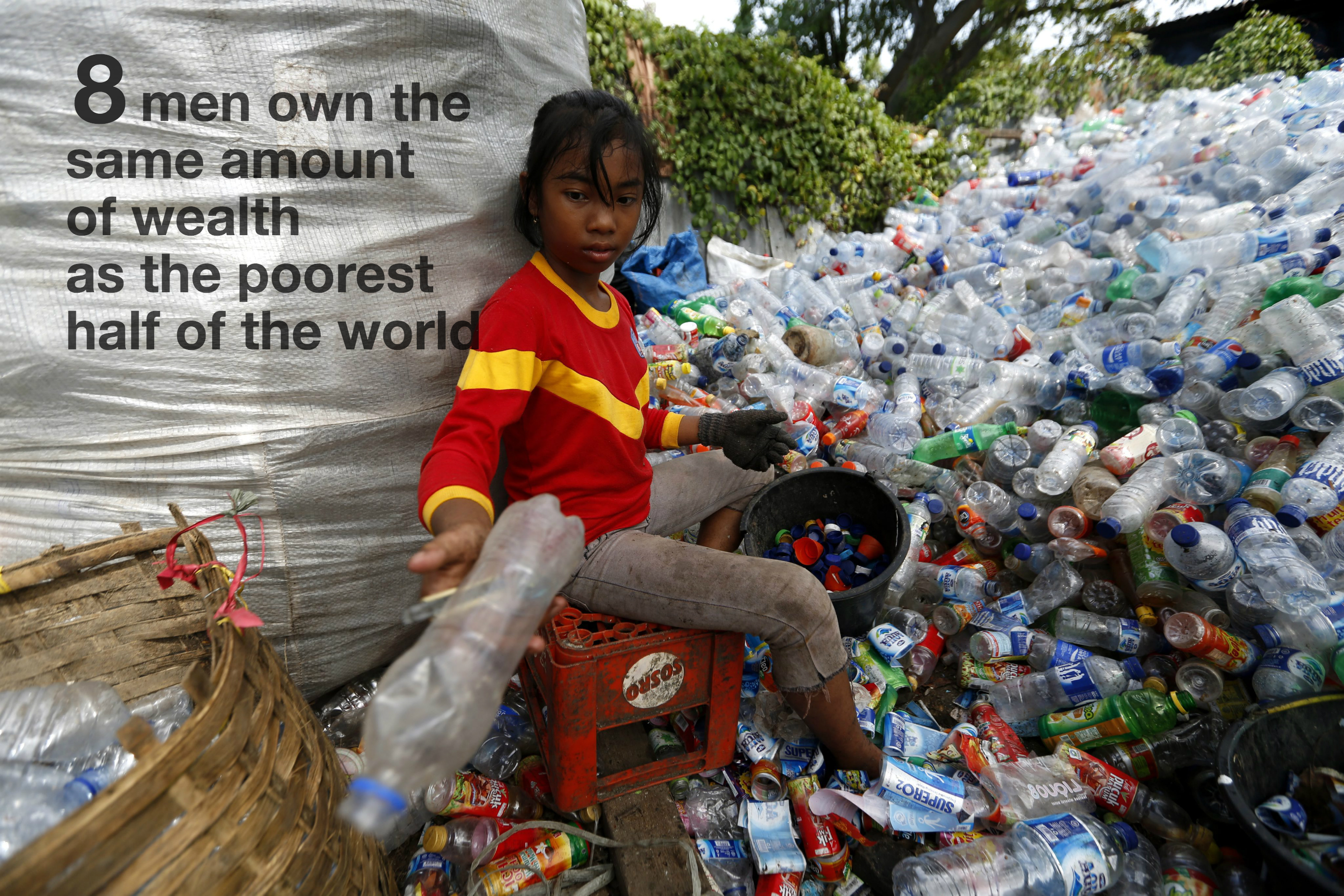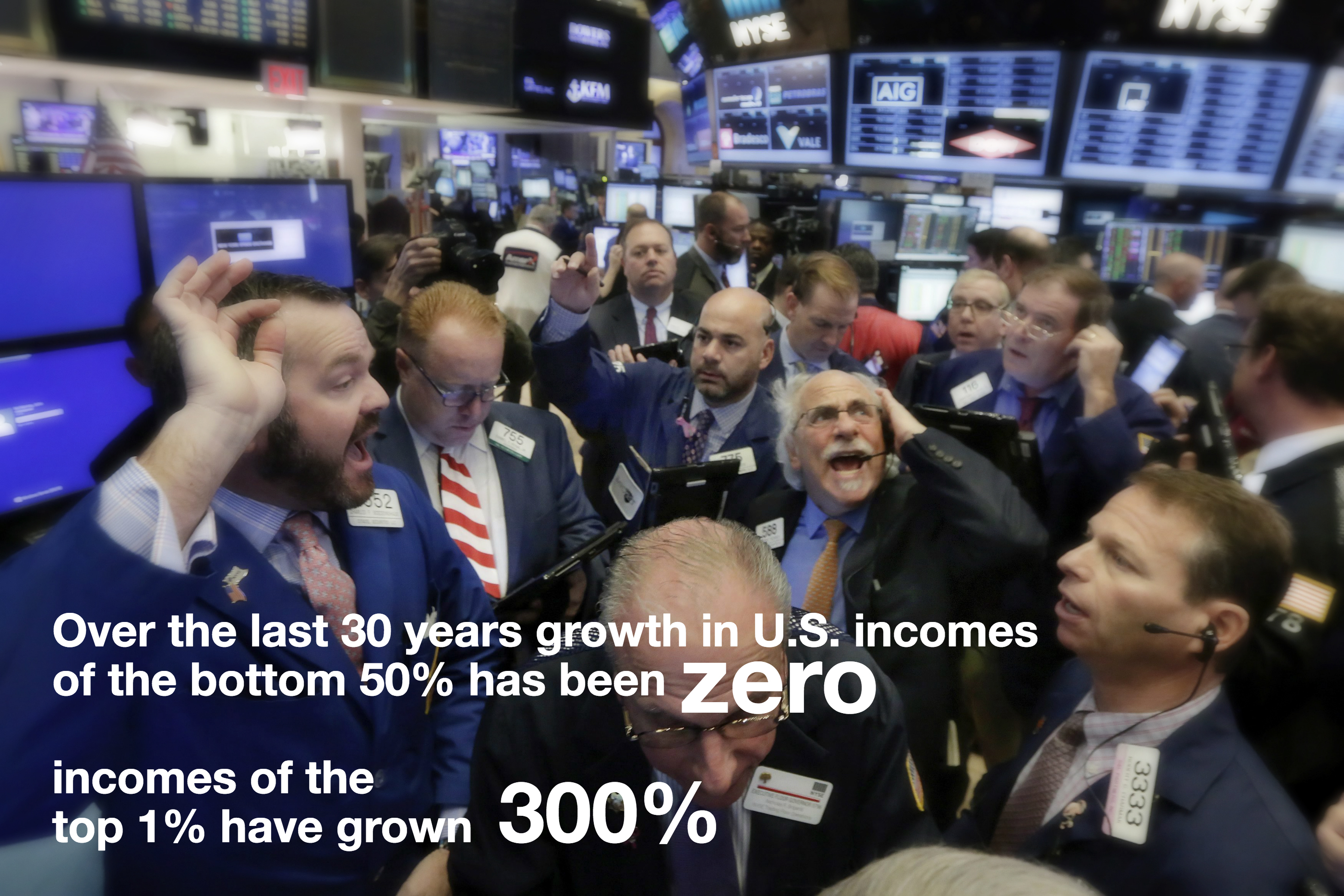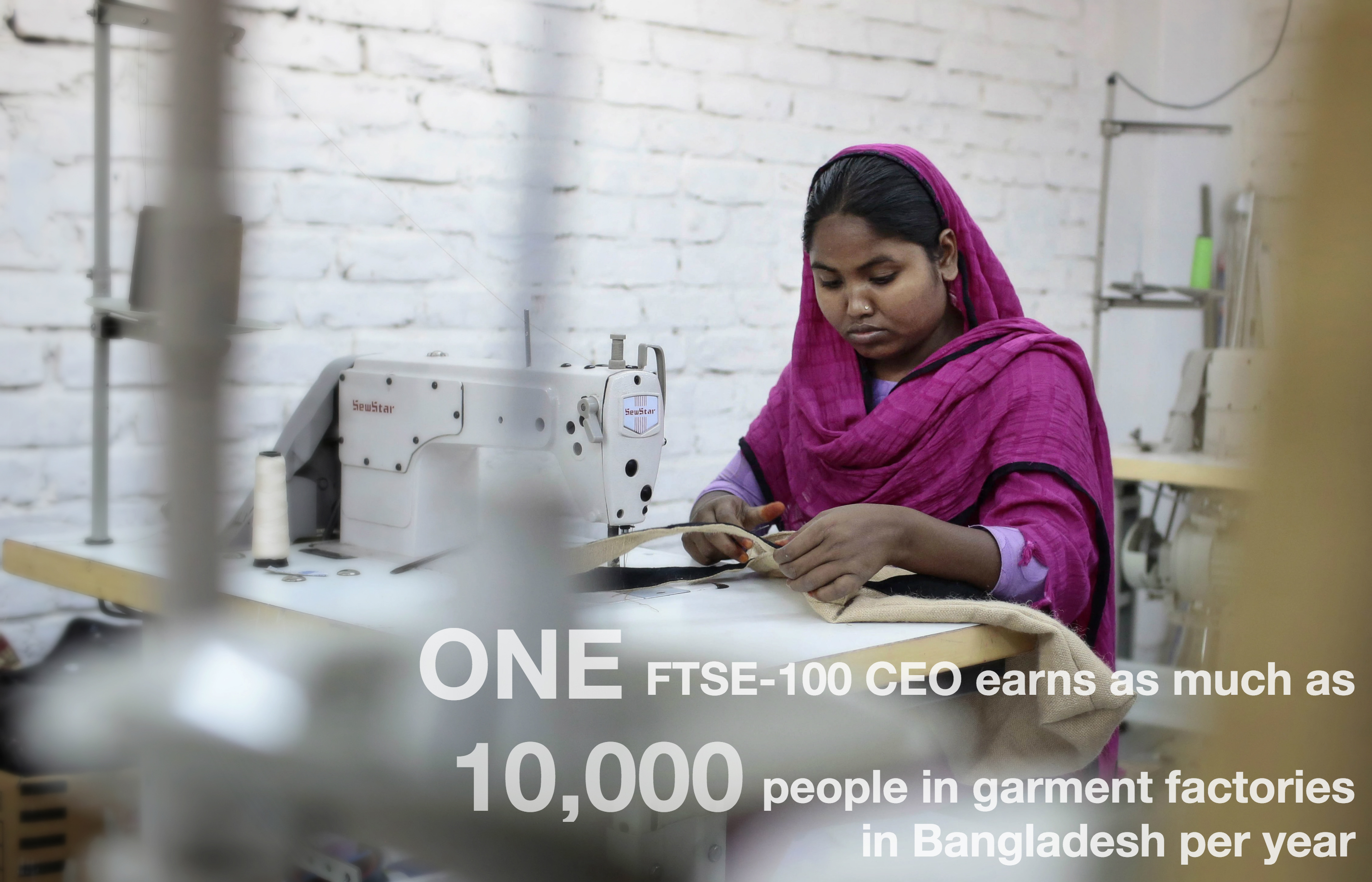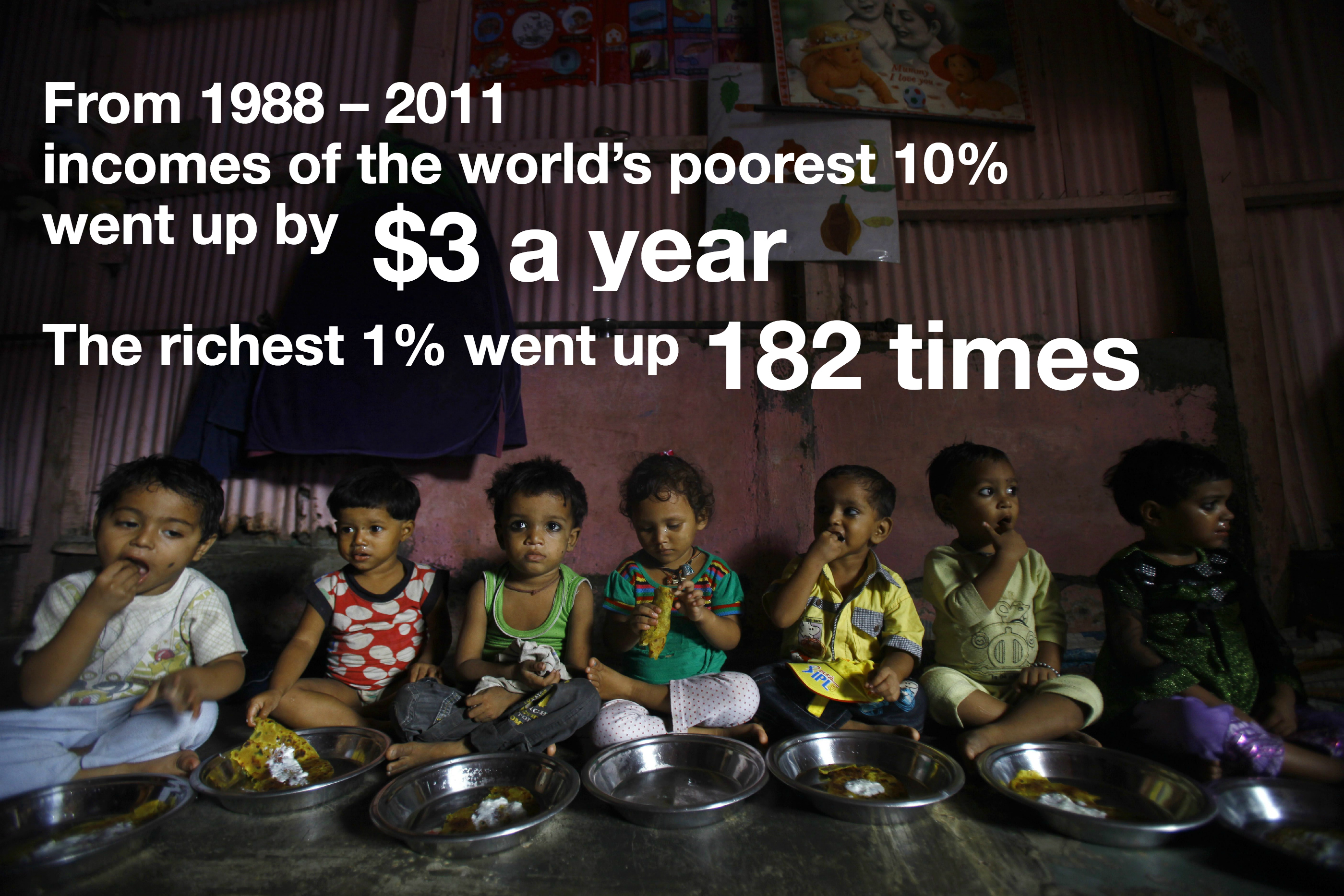Yet another report on global wealth inequality was published yesterday, delivering a scathing assessment of the rich-poor wealth gap.“An Economy for the 99 percent” compiled by Oxfam International, ahead of the World Economic Forum in Davos, Switzerland concluded that the world’s eight richest people have as much wealth as the poorest 50 percent of the world’s population. Here at home, Oxfam estimates that the two richest Canadians — specifically billionaire media magnate David Thomson and Galen Weston Sr. of Loblaw fame — have the cumulative wealth of 30 percent of the poorest Canadians.There’s been a bit of controversy about the methodology used in calculating the wealth gap between the super-rich and the very poor (I’ll get to that in a minute), but the overarching theme of the report remains valid — that economic inequality is prevalent, and unsustainable. Although the world is less poor that it was 50 years ago and the poverty rate in Canada has certainly declined in the last decade, the benefits of growth have not been evenly distributed — income inequality in OECD countries, for instance, is at its highest level in half a century. So what?If you’re upper middle-class or rich in Canada, that’s a question you might find yourself asking. Being rich-ish means that you will, for the most part, live a materially comfortable existence, relatively shielded from the day-to-day struggles of the bottom 40 percent of Canadian society. You’ll be able to save and invest a substantial chunk of money, live in a safe, quiet, green neighbourhood with good schools, travel, and put your kids through university so that they don’t graduate saddled with tens of thousands in debt. Inequality, in the short or even medium run, will probably not affect you.But if you’re at the two lowest rungs of the income ladder, the impact of inequality is what you see and feel and breathe every single day. Despite those 60 hour work weeks, you continue living paycheque to paycheque. You wonder why your hard work is deemed significantly less valuable than those in the upper echelons of the professional world. Your consumption patterns are, almost always, short-term. When it comes to spending, you cannot see beyond a month, or a week even. Forget saving or investing — those are goals as unattainable as being a unicyclist for Cirque Du Soleil.
So what?If you’re upper middle-class or rich in Canada, that’s a question you might find yourself asking. Being rich-ish means that you will, for the most part, live a materially comfortable existence, relatively shielded from the day-to-day struggles of the bottom 40 percent of Canadian society. You’ll be able to save and invest a substantial chunk of money, live in a safe, quiet, green neighbourhood with good schools, travel, and put your kids through university so that they don’t graduate saddled with tens of thousands in debt. Inequality, in the short or even medium run, will probably not affect you.But if you’re at the two lowest rungs of the income ladder, the impact of inequality is what you see and feel and breathe every single day. Despite those 60 hour work weeks, you continue living paycheque to paycheque. You wonder why your hard work is deemed significantly less valuable than those in the upper echelons of the professional world. Your consumption patterns are, almost always, short-term. When it comes to spending, you cannot see beyond a month, or a week even. Forget saving or investing — those are goals as unattainable as being a unicyclist for Cirque Du Soleil. One of the biggest problems with living in a society with a massive income gap is that on an economic level, at least, growth will become unsustainable. “The rich cannot eat away all the money they’ve got because they have too much, but you can be sure that the poor will spend every penny they have because they have so little to begin with,” Armine Yalnizyan, Senior Economist at the Canadian Centre for Policy Alternatives told VICE Money.Indeed, increasing inequality reduces demand for basic goods since consumption levels depend more on the wages of those at the lower end of the income scale than the profits of the rich. When households struggle to consume on steady but low wages, they will increasingly rely on debt to maintain their lifestyles, worsening their long-term ability to consume, and save.“This is an issue that every level of government is struggling with,” says Yalnizyan.
One of the biggest problems with living in a society with a massive income gap is that on an economic level, at least, growth will become unsustainable. “The rich cannot eat away all the money they’ve got because they have too much, but you can be sure that the poor will spend every penny they have because they have so little to begin with,” Armine Yalnizyan, Senior Economist at the Canadian Centre for Policy Alternatives told VICE Money.Indeed, increasing inequality reduces demand for basic goods since consumption levels depend more on the wages of those at the lower end of the income scale than the profits of the rich. When households struggle to consume on steady but low wages, they will increasingly rely on debt to maintain their lifestyles, worsening their long-term ability to consume, and save.“This is an issue that every level of government is struggling with,” says Yalnizyan. But income inequality is not just an economic problem, according to former Ontario premier Bob Rae. “It is unsustainable morally, environmentally and politically. The capitalism we have now, with weakened social and political structures around it, will create more havoc and worse results, unless we intervene effectively to steer the ship in a different way,” Rae told VICE Money.The wealth gap, not to be confused with the income gapOne of the biggest criticisms of the measure of economic inequality used in many reports, including Oxfam’s is that it equates wealth to income.“If you took my wealth, meaning my capital assets, you could call me a millionaire because of the home I own. That doesn’t necessarily mean that I have a million dollars in my pocket,” Carleton University business professor Ian Lee told VICE Money.Lee calls the Oxfam report ‘junk’, although he repeatedly emphasized how much good work Oxfam as a charity does for the poor. “These are two separate issues. I don’t have a problem with Oxfam. But in this report, they are pushing spurious allegations and bogus claims. Paper wealth is vastly different from income earned,” he says.Sure, if you break it down, David Thomson and his family do not actually carry around $28 billion in cash, just how Bill Gates does not have tens of billions of dollars at his immediate disposal. Most of that wealth is tied up in assets like property, stock options, stock grants and other kinds of investment products.“Are you saying that if a share price goes up, that widens inequality because the overall wealth of the owner of the company goes up too? Does that mean that you should produce shoddy products to reduce your share price to reduce inequality?” asks Lee.
But income inequality is not just an economic problem, according to former Ontario premier Bob Rae. “It is unsustainable morally, environmentally and politically. The capitalism we have now, with weakened social and political structures around it, will create more havoc and worse results, unless we intervene effectively to steer the ship in a different way,” Rae told VICE Money.The wealth gap, not to be confused with the income gapOne of the biggest criticisms of the measure of economic inequality used in many reports, including Oxfam’s is that it equates wealth to income.“If you took my wealth, meaning my capital assets, you could call me a millionaire because of the home I own. That doesn’t necessarily mean that I have a million dollars in my pocket,” Carleton University business professor Ian Lee told VICE Money.Lee calls the Oxfam report ‘junk’, although he repeatedly emphasized how much good work Oxfam as a charity does for the poor. “These are two separate issues. I don’t have a problem with Oxfam. But in this report, they are pushing spurious allegations and bogus claims. Paper wealth is vastly different from income earned,” he says.Sure, if you break it down, David Thomson and his family do not actually carry around $28 billion in cash, just how Bill Gates does not have tens of billions of dollars at his immediate disposal. Most of that wealth is tied up in assets like property, stock options, stock grants and other kinds of investment products.“Are you saying that if a share price goes up, that widens inequality because the overall wealth of the owner of the company goes up too? Does that mean that you should produce shoddy products to reduce your share price to reduce inequality?” asks Lee. There’s a good degree of validity to Lee’s argument against this methodology, but the same trend can be seen when you look at income. If you were to measure inequality using each individual’s disposable income, you would still find that we have a huge problem on our hands. A particularly reliable study is one published by the OECD in December 2015 that concluded that in 1990, the average disposable income of the richest 10 percent in OECD countries was seven times higher than that of the poorest 10 percent. Today, it’s around 9.5 times higher. That’s not as stark as Oxfam’s headline, but it is significant.“If you think inequality isn’t a problem, then why are we seeing so much political frustration playing out, and people campaigning and winning on the idea that a system is rigged?” says Yalnizyan.There remains a misconception among proponents of unbridled capitalism that addressing inequality equates to quashing ambition, and essentially reverting back to 19th century socialism. Rae outright rejects this notion.“Large bureaucratic states, where political power is highly controlling and centralized, have proven disastrous. So the question is — can we create an innovative society that is good for prosperity, social justice and deeper sustainability? It will not be easy, but it is the challenge of our time.”Follow Vanmala on Twitter
There’s a good degree of validity to Lee’s argument against this methodology, but the same trend can be seen when you look at income. If you were to measure inequality using each individual’s disposable income, you would still find that we have a huge problem on our hands. A particularly reliable study is one published by the OECD in December 2015 that concluded that in 1990, the average disposable income of the richest 10 percent in OECD countries was seven times higher than that of the poorest 10 percent. Today, it’s around 9.5 times higher. That’s not as stark as Oxfam’s headline, but it is significant.“If you think inequality isn’t a problem, then why are we seeing so much political frustration playing out, and people campaigning and winning on the idea that a system is rigged?” says Yalnizyan.There remains a misconception among proponents of unbridled capitalism that addressing inequality equates to quashing ambition, and essentially reverting back to 19th century socialism. Rae outright rejects this notion.“Large bureaucratic states, where political power is highly controlling and centralized, have proven disastrous. So the question is — can we create an innovative society that is good for prosperity, social justice and deeper sustainability? It will not be easy, but it is the challenge of our time.”Follow Vanmala on Twitter
Advertisement

Advertisement


Advertisement
